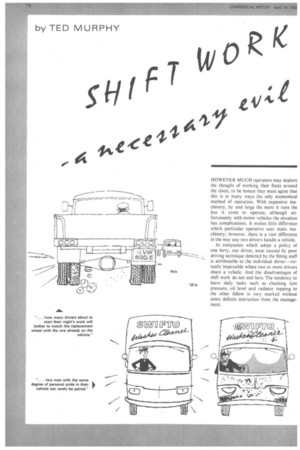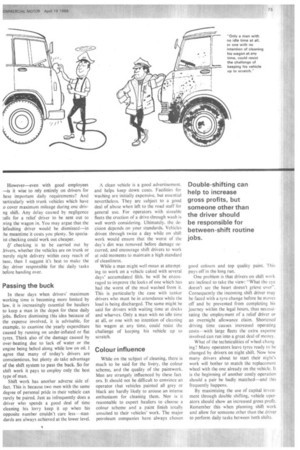HOWEVER MUCH operators may deplore the thought of working their
Page 76

Page 77

If you've noticed an error in this article please click here to report it so we can fix it.
fleets around the clock, to be honest they must agree that this is in many ways the only economical method of operation. With expensive machinery, by and large the more it runs the less it costs to operate, although unfortunately with motor vehicles the situation has complications. It makes little difference which particular operative uses static machinery; however, there is a vast difference in the way any two drivers handle a vehicle.
In companies which adopt a policy of one lorry, one driver, wear caused by poor driving technique detected by the fitting staff is attributable to the individual driver---virtually impossible where two or more drivers share a vehicle. And the disadvantages of shift work do not end here. The tendency to leave daily tasks such as checking tyre pressure, oil level and radiator topping to the other fellow is very marked without some definite instruction from the management. However—even with good employees —is it wise to rely entirely on drivers for hese important daily requirements? And )articularly with trunk vehicles which have o cover maximum mileage during one drivng shift. Any delay caused by negligence :alls for a relief driver to be sent out to wing the wagon in. You may argue that the iefaulting driver would be dismissed—in :he meantime it costs you plenty. So speciaist checking could work out cheaper.
If checking is to be carried out by irivers, whether the vehicles are on trunk or -nerely night delivery within easy reach of base, then I suggest it's best to make the day driver responsible for the daily tasks before handing over.
Passing the buck
In these days when drivers' maximum working time is becoming more limited by law, it is increasingly essential for hauliers to keep a man in the depot for these daily jobs. Before dismissing this idea because of the expense involved, it is advisable, for example, to examine the yearly expenditure caused by running on under-inflated or flat tyres. Think also of the damage caused by over-heating due to lack of water or the engine being belted along while low on oil. I agree that many of today's drivers are conscientious, but plenty do take advantage of the shift system to pass the buck. So for shift work it pays to employ only the best type of man.
Shift work has another adverse side effect. This is because two men with the same degree of personal pride in their vehicle can rarely be paired. Just as infrequently does a driver who spends a good deal of time cleaning his lorry keep it up when his opposite number couldn't care less—standards are always achieved at the lower level. A clean vehicle is a good advertisement. and helps keep down costs. Facilities for washing are initially expensive, but essential nevertheless. They are subject to a good deal of abuse when left to the road staff for general use. For operators with sizeable fleets the erection of a drive-through wash is well worth considering. Ultimately, the decision depends on your standards. Vehicles driven through twice a day while on shift work would ensure that the worst of the day's dirt was removed before damage occurred, and encourage shift drivers to work at odd moments to maintain a high standard of cleanliness.
While a man might well moan at attempting to work on a vehicle caked with several days' accumulated filth, he will be encouraged to improve the looks of one which has had the worst of the mud washed from it. This is particularly the case with tanker drivers who must be in attendance while the load is being discharged. The same might be said for drivers with waiting time at docks and wharves. Only a man with no idle time at all, or one with no intention of cleaning his wagon at any time, could resist the challenge of keeping his vehicle up to scratch.
Colour influence
While on the subject of cleaning, there is much to be said for the livery, the colour scheme, and the quality of the paintwork. Men are strangely influenced by these factors. It should not be difficult to convince an operator that vehicles painted all grey or black are hardly likely to arouse an intense enthusiasm for cleaning them. Nor is it reasonable to expect hauliers to choose a colour scheme and a paint finish totally unsuited to their vehicles' work. The major petroleum companies have always chosen good colours and top quality paint. This pays off in the long run.
One problem is that drivers on shift work are inclined to take the view: "What the eye doesn't see the heart doesn't grieve over". Consequently the incoming shift driver may be faced with a tyre change before he moves off and be prevented from completing his journey within the legal hours, thus necessitating the employment of a relief driver or an overnight allowance claim. Shortened driving time causes increased operating costs—with large fleets the extra expense involved can run into a great deal of money.
What of the technicalities of wheel chane ing? Many operators leave tyres ready to be changed by drivers on night shift. Now how many drivers about to start their night's work will bother to match the replacement wheel with the one already on the vehicle. It is the beginning of another costly operation should a pair be badly matched—and this frequently happens.
By maximizing the use of capital investment through double shifting, vehicle operators should show an increased gross profit. Remember this when planning shift work and allow for someone other than the driver to perform daily tasks between both shifts.








































































































































